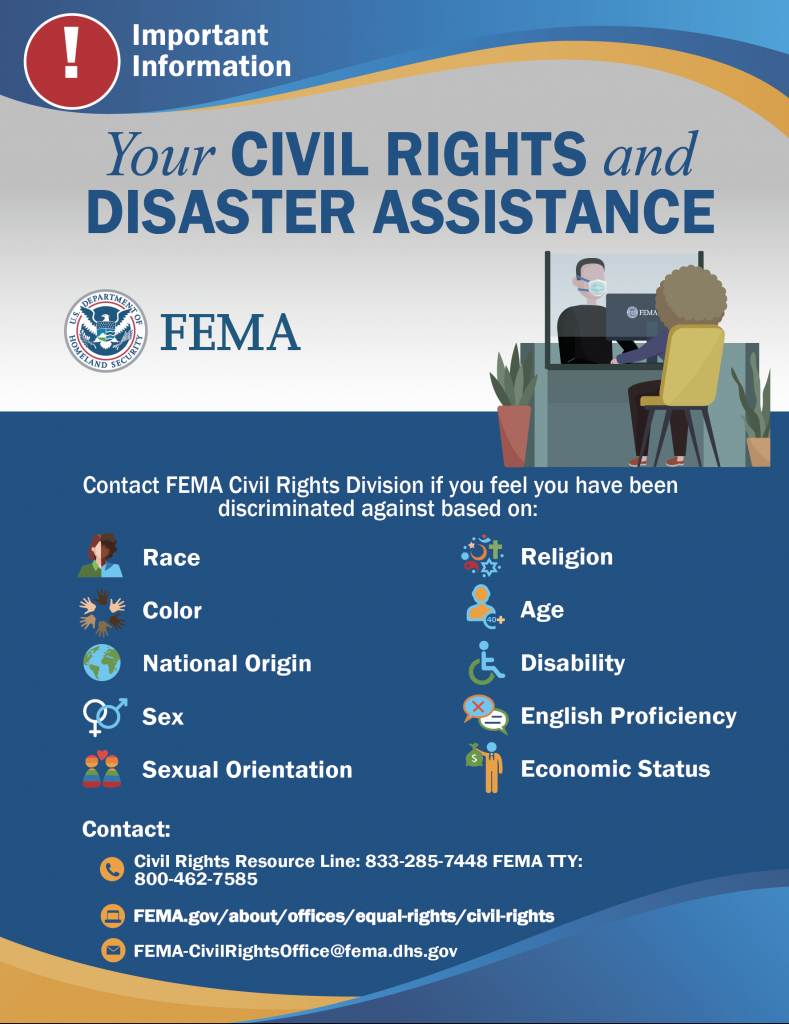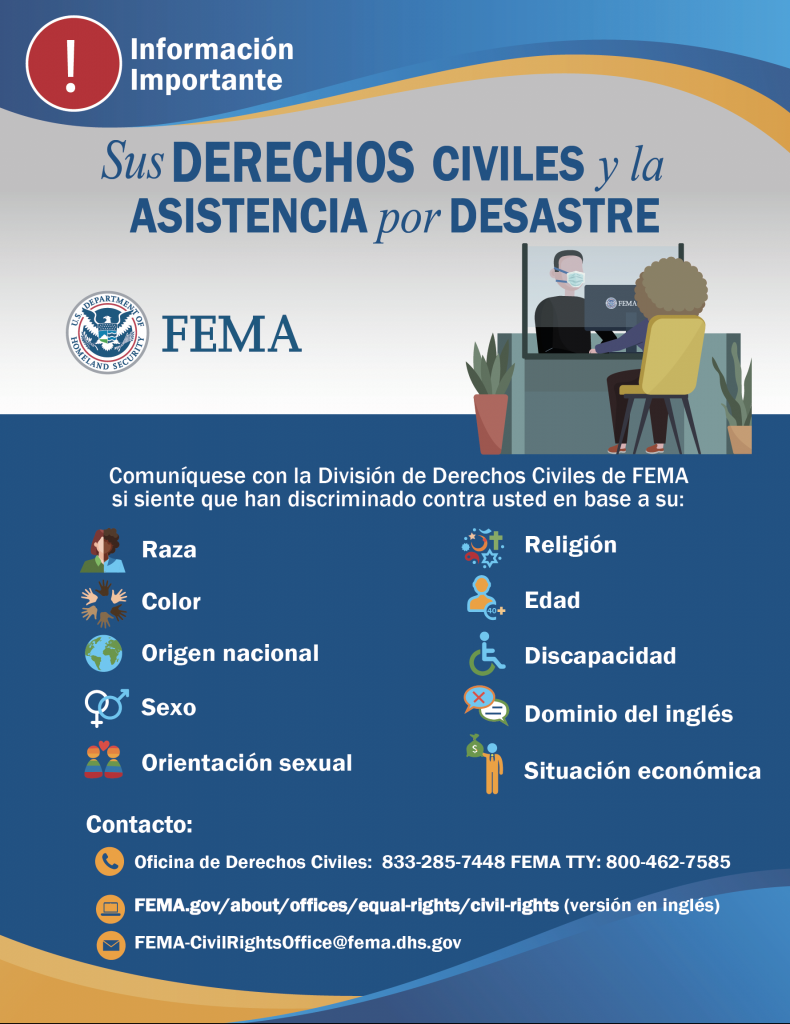Your Civil Rights And Disaster Assistance
The Robert T. Stafford Disaster Relief and Emergency Assistance Act of 1988 (Stafford Act) authorizes Federal assistance when the President declares a state, tribe, or territory to be a disaster area. Section 308 of the Stafford Act states:
“[The] distribution of supplies, the processing of applications, and other relief and assistance activities shall be accomplished in an equitable and impartial manner, without discrimination on the grounds of race, color, religion, nationality, sex, age, disability, English proficiency, or economic status.”
Section 309 of the Stafford Act applies these non-discrimination provisions to all private relief organizations participating in the response and recovery efforts.
In addition, Title VI of the Civil Rights Act of 1964 also protects individuals from discrimination based on race, color, or national origin in connection with programs receiving Federal financial assistance.
Section 504 of the Rehabilitation Act of 1973 requires FEMA to provide equal access to individuals with disabilities throughout FEMA’s programs and activities and throughout programs and activities carried out by recipients of Federal funds.
Section 508 of the Rehabilitation Act requires FEMA to provide members of the public who are individuals with disabilities seeking information or services access to and use of information and data the same way they would be provided to members of the public who are not individuals with disabilities.
What forms of discrimination are prohibited by Civil Rights laws?
FEMA and a state, local, tribal or territorial government agency or other organization running a FEMA-funded program cannot – either directly or by contract:
- Deny (intentionally or unintentionally) programs, benefits, or services or
- Provide a different program, benefit, or service or provide them in a manner different from the way they are provided to others
based on an individual’s race, color, religion, nationality, sex, age, disability, English proficiency, or economic status.
FEMA provides free aids and services to people with disabilities to communicate effectively with us, such as:
- Written information in Braille, large print, audio, accessible electronic formats
- Qualified sign language interpreters
- Computer Assisted Realtime Translation (CART)
FEMA also provides services to people whose primary language is not English, such as:
- Qualified interpreters
- Information written in languages other than English
If you need assistance to access a FEMA-provided or a FEMA-funded benefit, program, or service, please contact the Civil Rights Resource Line at (833) 285-7448 [ Press 1 for English, 2 for Spanish, 3 for the Language Line] or FEMA-CivilRightsOffice@fema.dhs.gov
What if I have a Civil Rights complaint?
If you believe you or someone you know has been discriminated against, call FEMA at (833) 285 – 7448 [ Press 1 for English, 2 for Spanish, 3 for the Language Line] send an email to FEMA-CivilRightsOffice@fema.dhs.gov or mail the written complaint to FEMA OFFICE OF EQUAL RIGHTS, Civil Rights Section, 500 C Street, SW, Room 4SW-0915, Washington, DC 20472. You must file your complaint in writing within 180 days of the alleged discriminatory act.
The civil rights complaint must include:
- Your name, address, and telephone number. Your complaint must be signed. If you are filing on behalf of another person, include your name, address, telephone number, and your relationship to that person, for example, friend, attorney, parent, etc.
- The name and address of the agency, institution or department you believe discriminated against you.
- How, why, and when you believe you were discriminated against. Please include as much detail as possible about the alleged acts of discrimination. Include names of individuals whom you allege discriminated against you, if you know them.
- Please include the names of any persons with additional information to support or clarify your allegations.
What will FEMA do with my complaint?
Once a complaint is filed, it will be reviewed by FEMA’s Office of Equal Rights to determine FEMA’s authority to investigate the issues you have filed a complaint about. If another agency has the authority to investigate, FEMA will notify you and send it to the appropriate agency. If FEMA has authority and has received a complete complaint, FEMA will investigate the complaint and will attempt to resolve any violations informally. If an informal resolution to address a concern or violation is unsuccessful, enforcement proceedings may be instituted.
What if I am retaliated against for asserting my rights or filing a complaint?
FEMA and a state, local, tribal or territorial government agency or other organization running a FEMA-funded program are prohibited from retaliating against you or any person because they opposed an unlawful policy or practice, or made charges, testified, or participated in any complaint action under a Civil Rights law. If you believe that you have been retaliated against, please contact FEMA’s Office of Equal Rights immediately.
English

Español

Discover more from Springfield Bottom Line
Subscribe to get the latest posts sent to your email.





